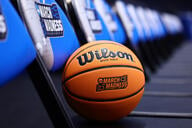You have /5 articles left.
Sign up for a free account or log in.
In a long-waged battle, Jane Meyer, a former senior member of the University of Iowa’s athletics department, sued her former employer, claiming discrimination based on gender and her sexual orientation -- and won.
Meyer’s unequivocal legal victory, which netted her $1.43 million in damages from the university, represents too a win for other women in collegiate athletics, experts say. They are women who have pending legal cases against their institutions, or who have not sued out of fear and could be heartened by the outcome of Meyer’s lawsuit.
In interviews, advocates say these biases are widespread, proven by the persistence of legal skirmishes over the years. Their proposed solutions: hire more female coaches and women in athletics leadership positions, and require clear, substantial training so everyone on campuses understands the federal law barring discrimination.
Meyer, since her start as the senior associate athletic director at the University of Iowa in 2001, was praised in performance reviews for her work and professionalism. But in 2011, shortly into the tenure of the new athletic director, Gary Barta, a phrase appeared on her written evaluation -- “heavy-handed” -- that smacked of prejudice, said Meyer’s attorney, Thomas Newkirk. His law firm represents people who have been discriminated against based on gender, race or sexual orientation, which can be relatively difficult to prove, he said.
“Unless there’s direct evidence, like someone said, ‘I don’t like that dyke,’ or used the n-word, you have to prove it through other mechanisms,” Newkirk said. Many women who have risen thought the ranks in academe (and other sectors) have complained for years that they are called things like “heavy-handed” when men are praised for being “decisive.”
Over the years, the relationship between Barta and Meyer soured. He assigned Meyer out of athletics and hired a man at a higher salary to take over her duties. Meyer was in a same-sex relationship with the university’s field hockey coach, Tracey Griesbaum, who was fired after the university investigated student complaints of bullying and harassment against Griesbaum and her other staff.
Though Griesbaum was cleared of those charges, Newkirk said, she was still fired. Meyer protested Griesbaum’s firing and drafted a memo detailing discriminatory department practices -- she was eventually fired, too.
A couple of their athletes and their families had complained about an “inappropriate” relationship between Meyer and Griesbaum, Newkirk said.
“There were little connections that something a lot more sinister was going on here,” Newkirk said. “That was our argument at trial. Barta was perhaps more of a politician than a horrible homophobe; maybe he thought this reflected poorly on the university.”
Meyer claimed in court discrimination on the basis of her gender and sexual orientation, including unequal pay, and that the university retaliated after she blew the whistle on the department’s practices.
She still may receive more damages, but so far was awarded $1.43 million in back pay and compensation for emotional distress.
The university denied wrongdoing in the trial and won’t decide whether to appeal the state jury verdict until post-trial motions have ended, according to a spokeswoman, Jeneane Beck.
President Bruce Harreld announced in a statement Friday the university will hire an outside organization to investigate its employment practices, beginning with the athletics department.
Activists for gender equity in interviews identified deep-rooted cultural biases against women in sports. Women don’t occupy many leadership positions in athletics, they pointed out.
Data provided by the National Collegiate Athletic Association show that of athletic directors, only 8 percent are white women, and 3 percent are minority women -- almost 75 percent are white men. About 63 percent of head coaches are white men, compared to 20 percent who are white women and 5 percent who are women of color.
Colleges and universities must pay attention to their hiring practices, said Neena Chaudhry, director of education for the National Women’s Law Center. In the K-12 education sector, opportunities to train and encourage women to enter the field should come early, Chaudhry said. She also called for equal pay for these women. (At most colleges and universities that compete at the NCAA's highest level, the biggest salaries go to men's football and basketball coaches.)
Many women in athletics are driven out of their jobs because they reveal inequities within a department, and so many of the legal cases revolve university retaliation, said Donna Lopiano, the president and founder of a consulting firm, Sports Management Resource. Lopiano specializes in issues related to Title IX of the Education Amendments of 1972, the federal law prohibiting gender discrimination.
Male coaches and athletic administrators aren’t judged for “strong-willed” behavior, but similar behavior for a woman can be trumped up as “unprofessional,” Lopiano said. “The double standard is palpable.”
Another prominent case of potential discrimination, widely covered by the media, concerned Shannon Miller, the out lesbian women's hockey coach at the University of Minnesota at Duluth. Miller filed a lawsuit in 2015 alleging she was harassed by her coworkers and that the university didn’t fund men’s and women’s athletics equally. She had been fired by the university, which said the dismissal was performance related.
That case has not yet been resolved.
Stereotypes come into play when women are perceived as too masculine and are accused of being too tough on athletes, Chaudhry said.
But student evaluations of female coaches shouldn’t affect their job status, Lopiano said. Inherently, students carry their own biases and may not be accustomed to the intensity of a coach’s methods, but it doesn’t necessarily count as abuse, she said.
Bringing a lawsuit against an institution requires fortitude because it can be psychologically and financially draining, Lopiano said.
Indeed, Deborah Slaner Larkin, chief of advocacy for the Women’s Sports Foundation, identified the barriers to following through with a suit as one of the reasons that college and university leaders may feel they can “get away” with this type of behavior.
A Women’s Sports Foundation study, “Beyond X’s and O’s,” found systemic bias against women in athletics. Women surveyed generally felt that men could secure promotions more easily and didn’t feel comfortable voicing their opinions among their departments.
“It seems so naïve and a little surprising, because these cases go before juries, who are real people, who are listening to the examples of discrimination that make them angry for someone like Jane. They see people not being treated right and the question is -- why do they keep doing this?” Larkin said of colleges and universities.




